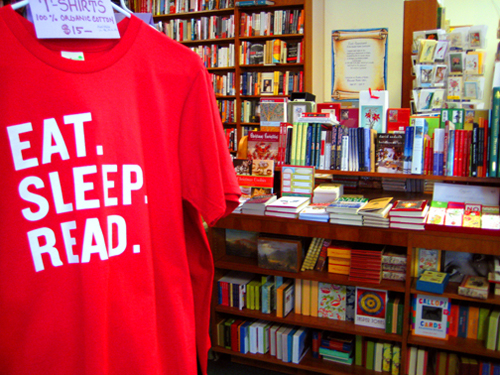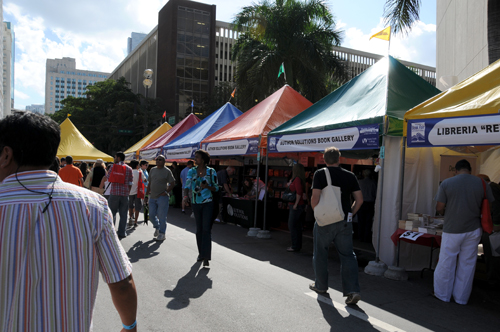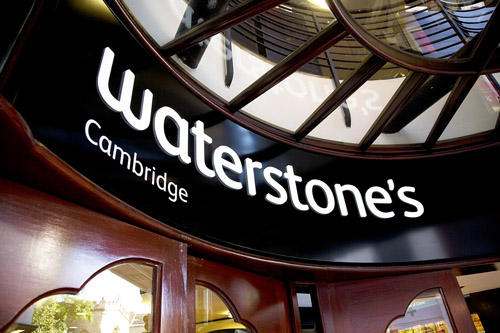
Main Street is off to a promising holiday season, オンラインおよび店舗での結果は、独立した書店での売り上げが伸びていることを示しています。 2011 オーバー 2010. 感謝祭の週のニールセンブックスキャンは、 15.5% 同じ週に 2010, and in-store websites powered by ABA IndieCommerce increased by 60% for Thanksgiving weekend (Black Friday through Cyber Monday) オーバー 2010.
The challenges that independent book stores face this holiday season are the same challenges that most brick and mortar retailers will face. The good news is that independent book stores can always be relied upon for extraordinary entrepreneurship. 結果として, many are already redefining their role for the future by finding new and compelling ways to differentiate themselves from online retailers. I had the pleasure of chatting with Oren Teicher, CEO of the American Booksellers Association, about the key factors responsible for the resurgence of the Main Street book store, とりわけ.
How will we read in the future?
まず第一に, I absolutely believe that with all of the changes we are seeing in publishing, we will grow the number of readers. What we know about book buyers is that they behave differently at different times. They buy books in different places. They read different titles. If you’re a reader, you don’t read one kind of book nor do you buy your book from only one retailer. The anxiety that exists in certain circles about the book business that the digital format is going to make print books obsolete is nonsense. We think the formats are going to complement each other. 実際には, we believe the formats will not only complement each other but will help each other grow and become stronger. An analogy that is often used is the movie business: back in the 1950’s, people thought that television was going to put movies out of business. Why would anyone go to the movies when you could watch television in your living room? Fast forward sixty years, it’s clear there’s a pretty strong movie business in America and a pretty strong TV business. These are different formats, and they do complement each other.
What trends are you seeing in terms of categories of books moving more quickly towards the digital format?
There are obvious categories that lend themselves to the digital format. I think genre fiction (mystery, ロマンス, and science fiction) lends itself to the electronic format because people are much more interested in immediate access to the latest titles and far less concerned about having a physical copy of the title on their shelves. In non-fiction you’ve got travel books, which is another example of a category for which there is a real advantage to having the content in an electronic format. しかしながら, I think we should be careful about drawing too many conclusions from the current trends. We don’t have enough data to really know what is going to happen. Last holiday season, millions of readers got iPads, Kindles, and Nooks. In January and February 2011, we saw a significant decline in sales in book stores. Time passed and some people still loved their new devices, but in addition, after playing with them for a while, others decided e-readers weren’t for them, and now those devices are collecting dust in their drawers. We expect this holiday season there will be another avalanche of e-readers. And a certain number of people are going to consume books in a digital format, but I think it is too early to know how many. 最後に, I think a very large number of readers will end up reading books in both formats.
How will the ABA participate in the e-book revenue opportunity?
For almost a year we have had a partnership with Google. There are around 350 member stores that use our e-commerce platform to sell digital content, and we are selling Google eBooks across the network of participating indie book stores. What we have learned is that it’s a lot more about the device than we originally thought. We’re aggressively in the process of trying to develop a device that our members can sell as well. There are of course many devices, and we will work with anyone who can assist our stores to sell digital content. あなたが知っているように, the major publishers have adopted the Agency Model (in the agency model the publishers set the price and designate an agent — in this case the bookseller — who will then sell the book and receive a commission on that sale). With regard to the sales of digital content, under the agency model the publishers are setting the price. If you search for an e-book title on an ABA member’s website and then you search for the same title on another retailer’s website, you will find in very many cases that the price for content is the same. The agency model has leveled the playing field.

How did the loss of Borders affect your members?
There are millions of customers who were shopping in Borders who don’t have a store today. Clearly for our members that was an opportunity. And despite all the quantum leaps forward with technology, nothing beats a physical bricks-and-mortar store to browse and discover new titles. Independent book stores pride themselves on being interesting and exciting places to shop, where you can meet knowledgeable and passionate booksellers. It’s an environment people like to come and hang out in. Independent book stores create interest by selecting a mix of products that the community is interested in seeing. They also are very active in hosting in-store events, which attract people to the stores. 加えて, they may form associations with local coffee shops, restaurants and art galleries. These are the things that book stores do to connect to their customers. また, a growing number of Americans understand that supporting their local businesses is good for the local economy.
What do you believe are the major challenges facing a large chain of book stores such as a Barnes & ノーブル?
I think it always makes more sense to talk about one’s own strategy, but I think that does speak to your question. 今日の世界で, bigger is not necessarily better. The advantages that our members have are that they are able to be nimble and can adapt quickly to change. They are not saddled with massive square footage of stores that are expensive to operate. In this area I think we have a competitive advantage. また, テクノロジー 20 years ago was a problem for independent booksellers. The large national chains could afford systems and we couldn’t. However the cost of technology has come down dramatically. We now operate websites for 350 店舗. We use state of-the-art point of sale systems and tracking systems. We’re able to get books to our customers within 48 営業時間. The book business is changing so fast. Being smaller allows you to adapt quickly and change more easily.

Photos courtesy of American Booksellers Association.
のために私たちは、読む方法をもっと? 記事: こちらをクリック
C言語. M. ルービンは広く読まれているオンラインシリーズの著者である, 教育のためのグローバル検索, また、3冊のベストセラーの著者である, 含めて 不思議の国のアリスリアル.
Cに従ってください. M. Twitterでルビン: www.twitter.com/@cmrubinworld





最近のコメント